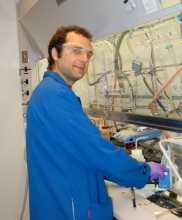
Major:
University:
Mentor(s):
Faculty Sponsor(s):
Faculty Sponsor's Department(s):
Project Title:
Project Description:
Polypeptoids are non-native materials that have been successfully used in a wide range of applications including but not limited to antimicrobial agents, drug and gene delivery, and lung surfactants. Compared to polypeptides, polypeptoids are resistant to proteolytic degradation making the investigation of peptoids extremely valuable to the medical, chemical, and biotechnical fields. However, the investigation of polypeptoid synthesis and the physical properties of the materials are predominately limited to glycine-monomer derivatives. In order to achieve greater control over the target specificity, hydrophobicity, and secondary structure of synthetic polypeptoid materials, the chemistry of alanine and phenylalanine peptoid derivatives are being investigated. Through developing alanine and phenylalanine peptoids and conditions for their coupling chemistry, polypeptoid materials can have inherent main-chain chirality and rigidity; characteristics that are lacking in glycine peptoids. In order to achieve these novel polypeptoid chains the unexplored peptoid Fmoc-monomer approach on a solid phase was used. Characterization of materials was performed via High Performance Liquid Chromatography (HPLC) and Matrix-Assisted Laser Desorption/Ionization (MALDI) Mass Spectroscopy. Data showed that coupling via triphosgene enabled alanine peptoids to covalently bind to glycine- and alanine-peptoidal monomers, and enabled phenylalanine peptoids to covalently bind to glycine- and phenylalanine-peptoidal monomers. Original reaction times ran overnight, but triphosgene coupling has been optimized to as fast as thirty minutes allowing for efficient and versatile synthesis of peptoid materials evolving current structure-property control.
